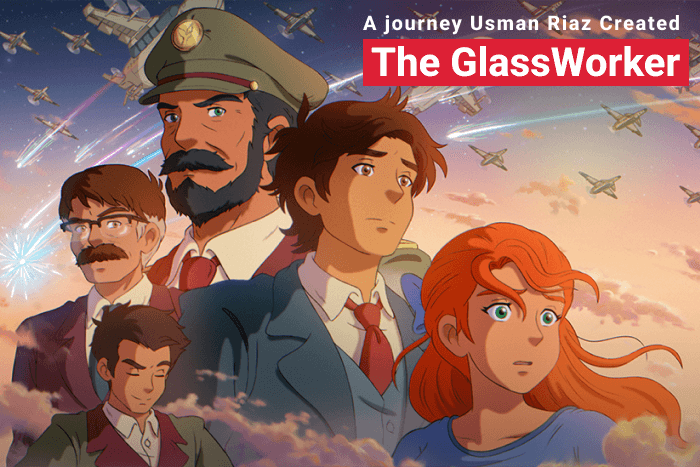
Glassworker: From Sand to Screen | Pakistani 1st Anime Gem
Ten years ago, a Pakistani musician Usman Riaz who’s also an artist, with a sparkling dream in his eyes, grabbed the pencil and began to sketch. He had no idea at that moment that he embarked on a journey
where he was going to make a remarkable history. He wanted to start something new in his homeland, Pakistan; that gave him worldwide recognition. That moment of beginning proved a blissful moment for him. That initial sketching later became Pakistan’s first hand-drawn animated feature film ‘The Glassworker.
Main Characters of the story ‘The Glassworker’
The primary characters in The Glassworker are:
● Vincent: An aspiring glassblower who is the male character and the protagonist of the story.
● Alliz: A talented violinist who is the female character of the story, the daughter of a military colonel, becomes entangled in Vincent’s life.
The Glassworker is partly about the romance between characters Vincent and Alliz.
Main story of ‘The Glassworker’
It is a story about two young people, Vincent and Alliz. Young Vincent and his father Tomas, who owned a glass workshop and there’s a war at that time, that could end their business as well as their lives. There’s Alliz, who’s the daughter of a military colonel and a talented violinist. They were growing up in a war-torn society.
Vincet’s relationship with Aliz begins to test the bond between Vincet and his father Tomas. This story explores the themes of:
● Love
● Loss
● Hope
● Power of art during wartime
Usman’s views about character development
Usman tells the Asian Network BBC that characters finally realise that
“that life is beautiful but fragile, like glass”
The Glassworker’ as an anti-war film
He explains that The Glassworker as an “anti-war film” set in a crazy, magical world that seems like where he was grown up! He says,
“I wanted to tackle issues and themes that would have been
difficult to tackle if it was based in Pakistan.”
The Glassworker’– a Passion Project of Usman
Pakistan does not have a flourishing film industry as neighbouring country India has. Also, there is neither
government support nor encouragement for new artists like Usman. He did everything on his behalf and finally, he made history by creating Pakistan’s first hand-animated movie ‘The
Glassworker.’
So, it was a passion project for him. It was something he really wanted to do.
The Glassworker’– a Passion Project of Usman
Pakistan does not have a flourishing film industry as neighbouring country India has. Also, there is neither
government support nor encouragement for new artists like Usman. He did everything on his behalf and finally, he made history by creating Pakistan’s first hand-animated movie ‘The
Glassworker.’
So, it was a passion project for him. It was something he really wanted to do.
Usman’s views about his journey
“These 10 years for me have just been purely driven with passion and obsession.”
“Since I was a child, I have loved hand-drawn animation and there’s something so magical about it.”
“The beauty of the lines drawn and painted by the human hand always resonated with me.”
From Pakistan to Japan:The Ghibli Influence on ‘The Glassworker
Usman says that he went all over the world to search for the best mentors for his film. His search took him even to Japan’s famous animation studio Ghibli.
‘The Glassworker’ style contains the imprints of Oscar-winning artists like Spirited Away and Princess Mononoke.
The experienced people at Ghibli studio also inspired him so he should make a movie by himself
From Crowdfunding to Cinema
Usman raised funds of almost $116,000 from a crowd campaign in 2016. Through this collection, he established his animation studio, named ‘Mano Animations.’
According to his views, making a movie has been really hard work, especially since 2019 when they started working on the movie full-time.
Usman says,
“What you are watching is essentially a moving painting,”
“Every single frame you see, whether it’s a background or the character moving, it’s all drawn by hand.”
Financial Struggles
Usman says that they have not earned any money yet from the movie. In the process of making this movie, he took financial support from his wife Maryam and cousin Khizer, to whom he could
not paid yet.
Perhaps this labour of love could be the anticipation of something truly extraordinary. And they will make money in the future with the success of this project.
Sharmeen Obaid Chinoy: The Mentor Behind ‘The Glassworker’
Another experienced film industry figure Sharmeen Obaid Chinoy to whom Usman Riaz went to seek guidance and help for his film ‘The Glassworker’. She’s the one who directed 3 Bahadur computer-generated story, Pakistan’s first-ever animated feature film.
When this movie 3 Bahadur was released in 2015 it broke every previous record even beating big American film Rio 2
When this movie 3 Bahadur was released in 2015 it broke every previous record even beating big American film Rio 2
Sharmeen Obaid Chinoy was the first one who ran the first female lead animation studio in Pakistan. Because of that, she’s well aware of the issues that come in the way while getting started in the animation field. She says; “Everything in Pakistan is driven by passion.” “I had to run pillar to post. “We’re a country that has limited access to electricity and our industry is heavily taxed. “We’re unable to import computers and hardware needed for animation.
Sharmeen’s view about ‘The Glassworker’
Sharmeen, who is going to make another upcoming blockbuster Star Wars movie “New Jedi Order”, is of the view that Usman’s ‘The Glassworker’ is a ‘monumental step’ for Pakistan’s animation
industry.
She thinks if this movie brings good economic success,it will really ‘ignite’ other people in Pakistan to get into the animation field. But she knows there are few barriers that are holding back Pakistan from becoming popular in the animation industry.
She says that the government only encourage the domestic industry in Pakistan if they work;
“provide an opportunity to create a level playing field for us to compete with the rest of the world”
She says,
“There is a lot of scope in Pakistan for animation’’
“We’ve just never been given the opportunity to create it.”
She says,
“Unfortunately, it will just be a few filmmakers who have that passion, who will continue to create films.”
But Sharmeen says she is waiting impatiently to see how the world
embraces The Glassworker. She says,
“I know that there is so much in there that will touch people’s hearts.”
Censorship Stumps Pakistani Animators
Arafat Mazhar who’s from Lahore-based Puffball animation says people in Pakistan already know animation yet there aren’t proper training or schools of animation here. He says,
“the technical skills are already there” in Pakistan despite there being “no formal training or schools available”.
But he asks to himself,
“how do you not censor yourself?”
This is the big problem which every filmmaker in Pakistan is facing,because there are very strict government rules regarding what can be shown in movies and what can not be. He says,
“Every time there’s a good film that comes out that’s sincere, the state ends up censoring it.”
He doesn’t believe these strict rules are going to end soon.
And Sharmeen also agrees with Arafat that things are not flexible, because they are not changing fast enough with the pace of time!
She says
“Unfortunately, it will just be a few filmmakers who have that
passion, who will continue to create films.”
Conclusion
After a decade of continuous hard work and struggle, Usman is finally able to find the love of his labour. The audience gave an overwhelming response to his movie. His main target was to elevate Pakistan’s film industry so that it could beat Bollywood, and he almost remained successful in his objective. But the journey in reaching this point was very hurdlesome and challenging.
In concluding words of Usman;
“It is extremely difficult, but we’ve done something nobody hasever done in the country before.”
“I think we’ve created something special that can stand toe-to-toe with the rest of the animation produced in the world.”
Huge support from the team “We Will Handle“


